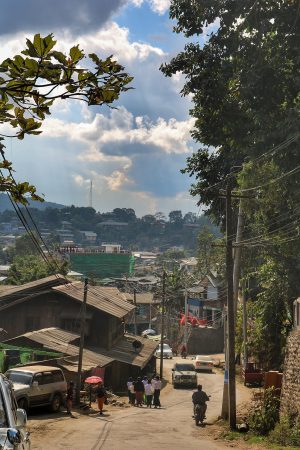Myanmar’s military government has defended its decision to launch air strikes that killed as many as 80 people in the north of Myanmar on October 23, ahead of an important meeting of Southeast Asian foreign ministers this week.
According to media reports based on sources from Kachin State, the airstrike hit an anniversary concert held by the Kachin Independence Organization (KIO), a prominent ethnic resistance group, in remote Hpakant township. The concert was part of a three-day celebration marking the 62nd anniversary of the KIO’s founding, and those killed included musicians and artists.
The attack was widely reported by international news wires and media outlets and prompted an immediate surge of condemnation from foreign governments, human rights groups, and other observers.
In a statement, Marzuki Darusman of the Special Advisory Council for Myanmar described the attack on the concert as “the ultimate act of junta cowardice and inhumanity.” The advocacy group Human Rights Watch described it as “an apparent violation of the laws of war, which prohibit attacks causing indiscriminate or disproportionate civilian harm.”
In the immediate aftermath of the attack, the military junta’s information office confirmed the air sorties but defended them as a “necessary operation” that was launched in response to “terrorist” acts by the Kachin Independence Army (KIA), the KIO’s armed wing.
In a statement emailed to media organizations yesterday, it expanded on these claims, trumpeting the airstrikes as a successful military operation that “left more than 50 insurgents dead and over 40 injured, including their commander and 5 high-ranking members.” It then went on to deny that the attack had targeted civilians.
“The strike targeted neither civilians nor a music concert but directly attacked the enemy fort as a military target,” said the statement, which was unsigned but can be presumed to come from the junta (or some sort of PR auxiliary). “Based on information from local people, the list of dead in battle proved a huge loss of KIA insurgents; therefore, with the aim to exploit the situation, they propagandized and accused security forces of targeting civilians.”
Appended to the statement was a purported list of those killed and injured in the attack, most of which were either officers or soldiers of the KIA, anti-regime People’s Defense Forces, or Aung San Suu Kyi’s National League for Democracy. Since seizing power in February 2021, the military administration has deemed each of these groups “terrorists.”
The statement is perhaps notable less for its content – self-righteous and dismissive of any criticism – and then for its nature. Sent from a Gmail account with a Myanmar flag avatar, the statement is the fruit of what appears to be a crude, incipient PR campaign aimed (unlike the turgid, state-run newspapers) at foreign journalists and observers. A previous email that I received from the email account included a litany of “terrorist attacks” carried out by the opposition National Unity Government (NUG), which is leading the resistance to the military government.
Despite its general indifference to international opinion, Myanmar’s military government is clearly beginning to see the need to respond to the negative international media attention. This may be especially the case ahead of this week’s special meeting of foreign ministers from the Association of Southeast Asian Nations (ASEAN).
The meeting is intended to assess the military junta’s adherence to ASEAN’s Five-Point Consensus peace plan, which calls for an immediate cessation of violence and inclusive dialogue involving “all parties” to the country’s conflict. As frustration builds within the Southeast Asian bloc over the behavior of its errant member – its last major meeting was preceded by the junta’s cold-blooded execution of four pro-democracy activists – it is also expected to judge whether to shift its stance ahead of next month’s ASEAN Summit in Phnom Penh.
In an ASEAN Chairman’s statement issued late last night, the Cambodian government offered further hints that the bloc’s preternatural patience and reverence for process was being strained by the military junta’s brutal reprisal attacks.
The statement said the ASEAN chair was “gravely concerned about the recent escalation of violence in Myanmar,” including a recent bombing at Insein Prison in Yangon, increased fighting in Kayin State, and the Kachin airstrike, which it said, “goes against the spirit of ASEAN’s Five-Point Consensus.”
“We urgently call on all parties to the conflict, in particular one with significant power on the ground, to take concrete actions to enable a process of inclusive and constructive dialogue,” the statement added. Whether ASEAN is willing and able to go much further than these sorts of coaxing statements will have to await Thursday’s meeting, and the bloc’s headline summit in November.

































